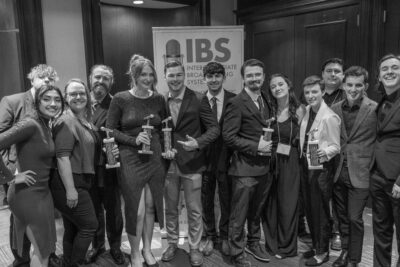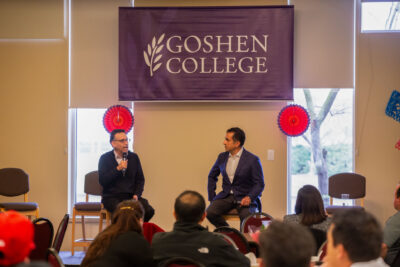The student body recently selected five peers to represent them as Student Senate members-at-large. Student Senate is made up of a total of ten students: four cabinet members and six members at large. The four cabinet members take charge of group organization through specific roles: President, Vice President, Treasurer, and Secretary. The current Student Senate president is Caleb Longenecker, a junior.
The recently elected members-at-large consist of Gretchen Geyer, a junior, Karsten Hess, a junior, Elizabeth Derstine, a sophomore, Maddie Gerig, a freshman, Ellen Conrad, a freshman, and Isaac Fast, a senior. The new members represent a variety of interests that span art, environmental stewardship, community service, GLBTQ+ issues and more.
Although members-at-large championed some light-hearted issues such as sleep-interrupting trains and ice cream at every campus event, they also expressed a readiness to address issues that require deeper reflection.
“I think it is neat to see the diversity of interest and clubs on campus” said Derstine. “I feel it is important to broadcast this diversity.”
Gerig held strong interest in campus identity as well, and mentioned that she hoped to promote understanding of Mennonite faith during her time as a representative.
“I would lean more on the side of saying this is a Mennonite institution and would hope that incoming students would know what that might mean,” Gerig said. “Goshen is a unique place.”
Addressing the continuing rift between students from a Mennonite background and students from other backgrounds was a common concern of the new members.
“A hot topic from last year was the ‘Menno Wall’” said Longenecker. “I hope that we can continue to facilitate these discussions and address new topics as they come up”.
Other shared concerns included deeper inclusion of GLBTQ+ community, equality of women sport programs, engaging students in the wider Goshen City community, and furthering the pursuit of environmental stewardship and care.
Outside of these uniting themes were several of the member’s more personal objectives. As one of his goals Hess identified a need to push for improvement of the control students are given over the cooling and heating in their campus housing. Gerig hoped to highlight the deterioration of the art building as well as its inaccessibility to some people with movement limiting handicaps. Developing the long-term goals of the GC Service Club and ensuring its continuation is a goal of Fast’s. Improving the quality and range of food choices available at the dining hall-- particularly for students with specific dietary concerns or limits -- was an issue Conrad hoped to address.
Already a couple of meetings into the year, Longenecker reflected that the group was working together well. Meetings have mostly dealt with logistics thus far and the group seemed excited to move onto student issues.
One opportunity to express concerns to the college ruling body is approaching quickly. On October 12, Student Senate and a few selected students will be meeting with the Goshen College Board of Directors and the President’s Council. This will be a closed meeting.
“We welcome tough questions,” said Longenecker. “This may be the only time we get to meet with the board and council this semester, or even year.”
The Goshen College Board of Directors are the representatives of the Mennonite Education Agency (MEA) and the link to the various constituencies of Mennonite Church USA and provides leadership and strategic direction of the institution. The President’s council serves to carry out those plans and manage daily college function.
The Mennonite Education Agency holds educational institutions accountable to the approved statement of mission and vision of the Mennonite Church USA Executive Board. The MEA has the authority to address in appropriate ways any plans or actions of Goshen College that are inconsistent with the approved mission and purpose, are not in the long-term interest of the institution or the church, or hamper another Mennonite church agency or educational institution from achieving its mission.
Longenecker asked that students please submit any of their concerns by email to senate@goshen.edu in order to present them to the gathered groups.
He again stressed, “It’s kind of a big deal because the board and council usually meet once [each] with faculty, student body, and alumni. This may be the only opportunity of the student body this year.”

